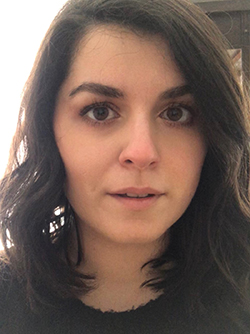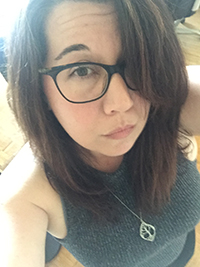Second Person: Alethea Spiridon in Conversation with S.C. Bayat

S.C. Bayat, whose story "Wild, Sweet Orange" appears in the Malahat's Spring 2018 issue, discusses point of view, capricious characters, and letting a story percolate in her Q&A with Malahat volunteer Alethea Spiridon.
S.C. Bayat’s stories have appeared in PRISM International, Little Fiction, The Dalhousie Review, and The Malahat Review. In 2016, she was a semifinalist for the Carve Magazine Raymond Carver Short Story Contest, and was longlisted for the PRISM International Short Fiction Contest. She holds a BFA with distinction in Writing from the University of Victoria, and was awarded the North American Bursary from the University of East Anglia, where she is currently pursuing her MA in Creative Writing Prose Fiction.
Are the characters you choose to write about based on people you know or are they a patchwork collage of people you've collected along the way in your journey of just living, as is so often the case?
It always seems to me that they come fully formed and from nowhere, somehow, rather than through a conscious piecing together, though I suppose the reality of it is that there’s a subliminal borrowing of traits that occurs – a particular nose here, an aversion to banana-flavoured things or a fondness for painting dog portraits there. I think if you’re writing about people, then you must hold a certain amount of interest in observing and knowing them, and so it’s inevitable that you’ll accumulate all this information and understanding, which will then lend itself to creating a dynamic character. So yes, that’s a long-winded way of saying I’m a patchwork kind of writer.
In "Wild, Sweet Orange," you use the second person point of view, an interesting approach that isn't used very often. It certainly adds a level of intimacy that third person and first person may not have succeeded in giving. Was this a conscious choice or did it come about after a few drafts? Did you try writing it in another point of view, or was it only ever drafted as second POV narrative?
I was aware that it needed to be in the second person before I actually sat down to write it (do people ever stand up to write?), and so it’s only been drafted in that particular POV. The protagonist, I felt, needed distance from her grief, from the event itself, and even from her fraught relationship with Patrick, so that she might attempt to fathom this life-shifting, awful thing. In any other POV, the prose had a danger of slipping into melodrama, or perhaps focusing too much on the immediate shock and trauma of the event, but second person allows you to shift through all the muddy emotion and get right to the analyzing because the protagonist is able to sort of step back and look in, rather than tell the story from the thick of it.
Writing has a way of not only changing the person who reads a particular work, but the very act of writing itself often changes the writer herself. Do you find that with each piece you write you change somehow? If so, in what ways?
I don’t think it changes me, not in any significant way that I’m aware, but writing is certainly a learning experience. The world – life, really – can seem an unfathomable place at times, and creative expression of any kind is a tool to understanding what we see, what we feel, and what it all means. So I’ll end by saying the Arts are important, which has nothing to do with your original question, but.
When writing your characters, like Patrick for example, do you have a clear sense of who they are and their trajectory before you even put pen to paper, or does it develop as you begin the act of writing?
The answer lies somewhere in the middle. I’ll begin a story thinking I have a character sussed out, but invariably they’re more capricious than that. For the most part, the changes aren’t too significant (Patrick, for example, didn’t surprise me mid-way in) but sometimes a character will end up nothing like who I’d initially imagined them to be, which may lead the story in an unexpected direction. So far, this hasn’t been problematic or tedious, knock on wood.
People, writers and readers alike, are typically curious about a writer's habits, myself included. Do you have a certain routine you follow daily for your writing practice, or is it more flexible? Is there a piece you are working on right now that you can tell us a bit about?
It’s definitely (too) flexible. I’m hesitant to call it a “routine” as that would imply I have discipline, which I do not. I wish that I wrote a little or, even better, a lot each day – hell, I’d even take each week – but I get too distracted to write with any kind of constancy. Instead, I seem to rely on fitful bursts to get anything done, and that’s usually in the face of an impending deadline. I hope this doesn’t make me sound like I’m dispassionate about writing, because I’m not. But I am a big believer in letting things percolate, and I’m useless if I haven’t mulled (obsessed) over the thought of something for a considerable time before I actually write the thing. As for what I’m currently working on, I’d rather not say. Not because I’m secretive, but if I discuss my drafts then I quickly lose all interest in them, and I’m already too unfocused with my writing, thank you very much.

Alethea Spiridon
* * * * * * * *









